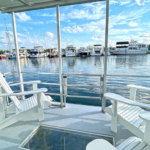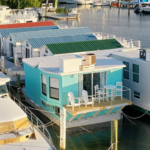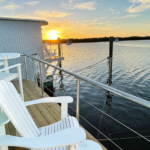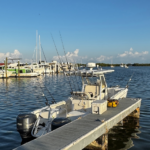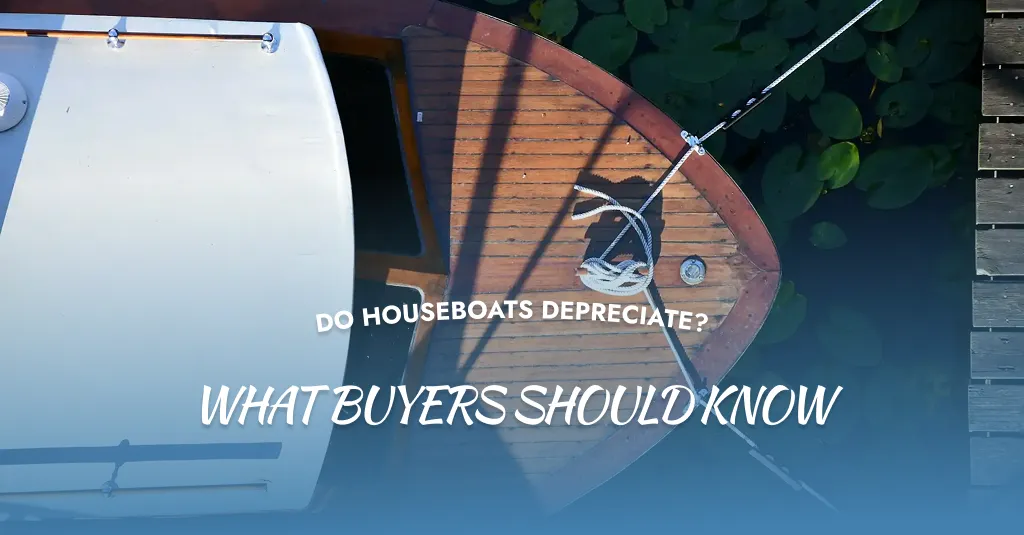
Do Houseboats Depreciate? What Buyers Should Know
When I first started daydreaming about living on a houseboat, bobbing gently in the Florida Keys with a cold drink in hand, I couldn’t help but wonder: Do houseboats depreciate? It’s a question that pops up for anyone considering this unique lifestyle, whether you’re eyeing a cozy pontoon setup or a luxurious floating home.
Unlike traditional homes, which often climb in value over time, houseboats follow a different financial path, one that can feel more like buying a car than a condo. Drawing from insights and real-world trends, plus the vibe of places like Mangrove Marina in Tavernier, this guide dives into whether houseboats depreciate, how they hold resale value, what drives their prices, and if they’re tougher to sell than land-based homes. If you’re weighing a houseboat purchase, here’s the lowdown to help you navigate the waters.
Having spent time around marinas and chatting with houseboat owners, I’ve seen the appeal of this lifestyle, freedom, water views, and a break from suburbia. But the financial side? That’s where things get interesting. Let’s break it down.
The Big Question: Do Houseboats Depreciate Like Boats or Appreciate Like Homes?
The short answer is yes, houseboats depreciate, but it’s not a one-size-fits-all story. Unlike traditional real estate, which often gains value due to land scarcity, houseboats typically lose value over time, much like vehicles or recreational boats.
According to industry insights, houseboats depreciate fastest in the first few years, often dropping 20-30% within the first five years of ownership. After that, the rate slows, leveling off around $100 per foot for older models. For example, a $100,000 pontoon houseboat might lose $20,000-$30,000 in value by year five, depending on its condition and market demand.
But here’s the twist: not all houseboats depreciate at the same pace. Floating homes, stationary houseboats moored permanently, often with land or dock rights, can sometimes appreciate, especially in desirable locations like the Florida Keys or Seattle’s Lake Union. If you’re eyeing a spot at Mangrove Marina, their houseboat lodging lets you test this lifestyle while you weigh the investment.
So, do houseboats depreciate universally? Generally, yes, but factors like type, location, and upkeep can bend the curve. Let’s explore why.
Holding Their Worth: Do Houseboats Retain Resale Value?
When it comes to whether houseboats retain resale value, the answer hinges on a few key variables. Well-maintained houseboats in high-demand areas, like the Keys, where waterfront living is a hot commodity, can hold their value better than neglected ones in less desirable spots. For instance, a houseboat with modern upgrades, like energy-efficient systems or a sleek interior, might fetch a better price than a run-down model. Brands like Gibson or Stardust, known for quality, also tend to retain value better, similar to how a Toyota holds up better than a generic car.
However, houseboats don’t typically build equity like homes. Their resale value often stabilizes after the initial depreciation hit, but don’t expect big profits unless you’ve got a rare, high-demand model or a floating home tied to valuable moorage. A 2023 study noted that classic or restored houseboats, like vintage Chris Craft conversions, can even appreciate if demand outstrips supply. If you’re docking at Mangrove Marina, their wet slips provide a prime location that could boost your boat’s appeal when it’s time to sell.
What Affects the Resale Price of a Houseboat?
Wondering what affects the resale price of a houseboat? Several factors come into play, and understanding them can help you make smarter buying or selling decisions:
Condition
A pristine houseboat with a solid maintenance log—think regular hull cleaning and engine checks- commands higher prices. Neglect, like rust or mold, can tank value fast. Mangrove Marina’s mechanic racks make upkeep easier with professional services.
Age
Newer houseboats depreciate faster initially, losing 10-15% in year one, but older, well-kept models can hold steady.
Location
Houseboats in popular boating areas, like the Florida Keys or Lake Powell, retain value better due to longer boating seasons and demand.
Upgrades
Modern amenities, solar panels, updated navigation, or a revamped galley, can boost resale price, but quirky customizations might scare off buyers.
Market Demand
Trends matter. Pontoon houseboats, popular for their stability, might sell faster than niche designs in a soft market.
Mooring Rights
For floating homes, secure dock space in a prime marina can add significant value, sometimes more than the boat itself.
For example, a converted barge at Mangrove Marina, moored in their hurricane-hole basin, might hold value better than a similar vessel in a less protected spot. Regular maintenance, like their $25/foot haul, wash, and paint service, can slow depreciation.
Selling Challenges: Are Houseboats Harder to Sell Than Homes?
Are houseboats harder to sell than homes? In short, yes, but it’s not insurmountable. Houseboats cater to a niche market, which means fewer buyers compared to traditional homes. Selling a houseboat can take longer, especially in off-seasons or areas with low boating interest. For instance, a Keys houseboat might move faster than one in a colder climate where boating is seasonal.
Homes benefit from a broader appeal and real estate agents who streamline the process. Houseboats, classified as personal property, often rely on boat brokers or platforms like BoatTrader, and sales can drag if the boat’s condition or price isn’t competitive. Upgrades matter, but over-personalized mods (think neon interiors) can deter buyers who want move-in-ready vessels.
That said, a well-maintained houseboat in a hot spot like Tavernier, with access to Mangrove Marina’s dry racks for storage, can attract serious buyers. Timing helps—listing during peak boating season (spring/summer) boosts interest. Unlike homes, houseboats don’t typically appreciate, so sellers need realistic price expectations based on current market trends.
Tips to Minimize Houseboat Depreciation
Want to keep your houseboat’s value afloat? Here are practical steps to slow depreciation and boost resale potential:
Regular Maintenance
Schedule hull inspections and engine tune-ups. Mangrove Marina’s working yard offers affordable services to keep your boat shipshape.
Smart Upgrades
Invest in universal appeal, think stainless steel appliances or solar panels, over quirky customizations.
Protect Against Wear
Use covers to shield from UV rays and store indoors during off-seasons to prevent weather damage.
Choose a Prime Location
Mooring in a desirable marina like Mangrove, with its fuel facilities and amenities, enhances value.
Document Everything
Keep detailed records of maintenance and upgrades to reassure buyers of your boat’s condition.
These steps can’t stop depreciation entirely, but they’ll help your houseboat stand out in a competitive market.
Final Thoughts: Navigating the Houseboat Investment
So, do houseboats depreciate? Yes, most do, especially in the early years, but strategic care and location can soften the blow. Whether you’re dreaming of a floating home or a mobile retreat, understanding how houseboats retain resale value, what affects their price, and the challenges of selling them is key to making an informed purchase. It’s not about chasing equity like a traditional home; it’s about embracing a lifestyle where the water is your backyard.
Ready to explore houseboat living? Head to Mangrove Marina in Tavernier, where you can try houseboat lodging, dock at their wet slips, or unwind at their restaurant. Book a visit today and see if the houseboat life is your next adventure!
FAQs
Do houseboats depreciate?
Yes, houseboats depreciate, typically losing 20-30% in the first five years, though floating homes in prime locations may appreciate.
Do houseboats retain resale value?
Well-maintained houseboats in high-demand areas retain value better, but they rarely build equity like homes.
What affects the resale price of a houseboat?
Condition, age, location, upgrades, market demand, and mooring rights all impact resale price.
Are houseboats harder to sell than homes?
Yes, due to a niche market and seasonal demand, houseboats often take longer to sell than homes.
How can I slow houseboat depreciation?
Regular maintenance, smart upgrades, UV protection, and mooring in desirable spots help preserve value.
What’s a good place to try houseboat living?
Mangrove Marina in the Florida Keys offers houseboat lodging and docking to test the lifestyle.

